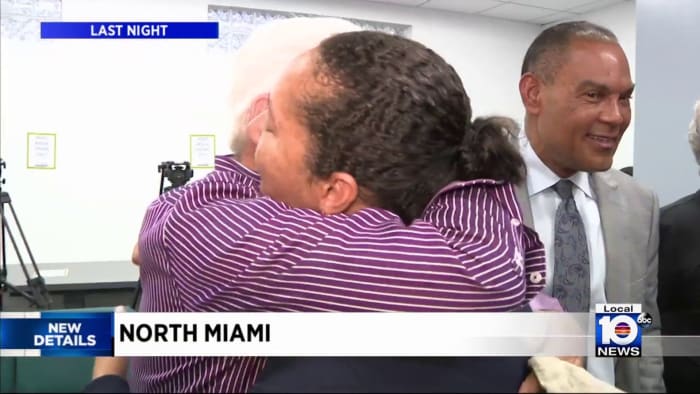Health
New Jersey twins receive matching heart surgeries after Marfan syndrome diagnosis: 'A better life'
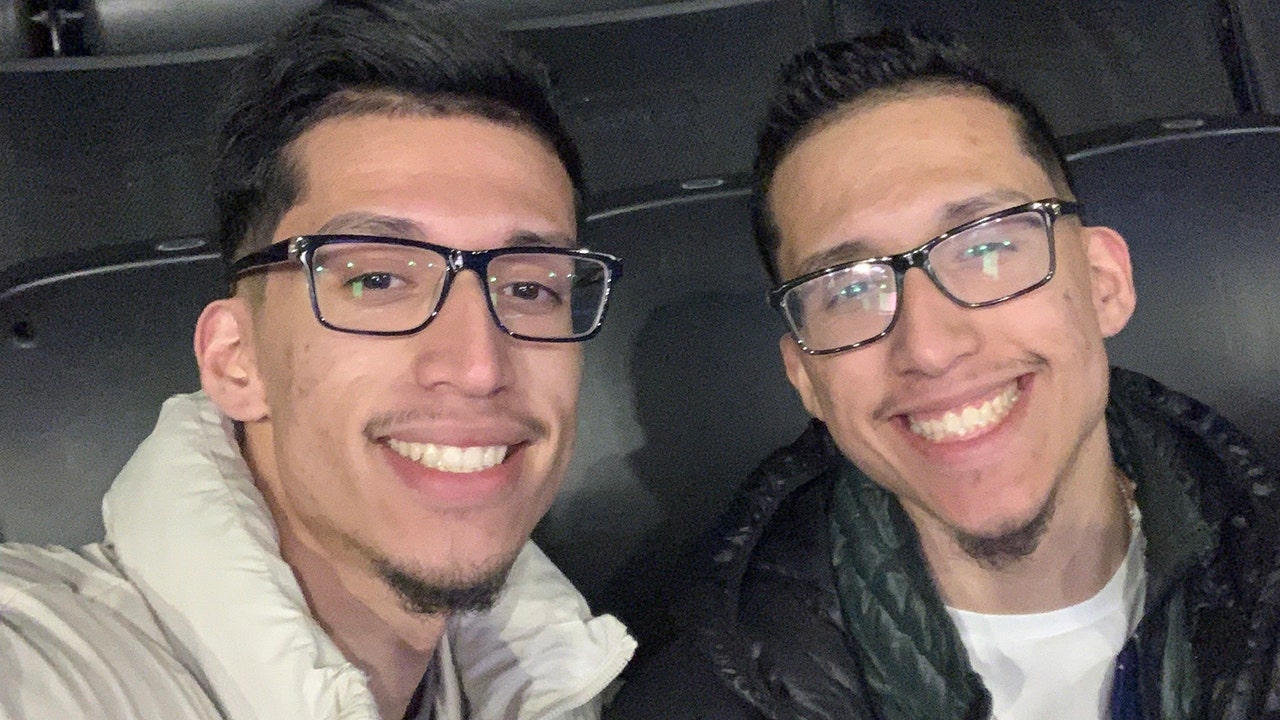
The notion that twins do everything together has met a new standard.
Identical twin brothers Pablo and Julio Delcid, 21, underwent matching heart surgeries on the exact same day following their diagnosis of Marfan syndrome.
The duo, of Dover, New Jersey, had been alerted to their risk of Marfan syndrome because a majority of their family members also have it, the twins told Fox News Digital in an on-camera interview.
FOUR TEXAS RESIDENTS FOREVER CONNECTED BY TWO KIDNEY DONATIONS IN DIFFERENT CITIES: ‘SUPERBLY TIMED’
“We’re a family of five. I have two older sisters who have it,” Julio Delcid said. “My older brother doesn’t have it as much … But I also have other family members who have it, too — pretty much through my whole family on my mom’s side.”
Left to right, Pablo Delcid and Julio Delcid celebrate Christmas with some of their family members. (Pablo and Julio Delcid)
“It’s very genetic,” Pablo Delcid added. “When we were younger and were first diagnosed with it, nobody knew what it was.”
He added, “Nobody knew they even had it until tests kept coming in, and they were like, ‘Yeah, it’s pretty genetic. Everyone should get tested.’”
What is Marfan syndrome?
Fox News Digital spoke with Dr. Benjamin Van Boxtel, surgical director at the Atlantic Aortic Center at Morristown Medical Center, in a separate interview about the condition; he performed the twins’ surgeries.
The cardiovascular surgeon said that while Marfan syndrome is mostly genetic, it can also occur at random. It’s a defect of the gene that creates connective tissues in the human body, he said.
FLORIDA STUDENT AND TEACHER BOND OVER MATCHING SCARS FROM THEIR OPEN-HEART SURGERIES: ‘TOUGH COOKIES’
“Because it’s a broad defect in these connective tissues, it can affect many different parts of the body,” he said. “So, this could be anywhere from the eyes to the spine and … the heart.”
“The most dangerous symptom you could develop with Marfan syndrome is a dilation of the aorta, specifically in the root,” he added.
Van Boxtel said the aortic root in Marfan syndrome can become dilated or enlarged, which can cause an “immediately fatal” tear or rupture.
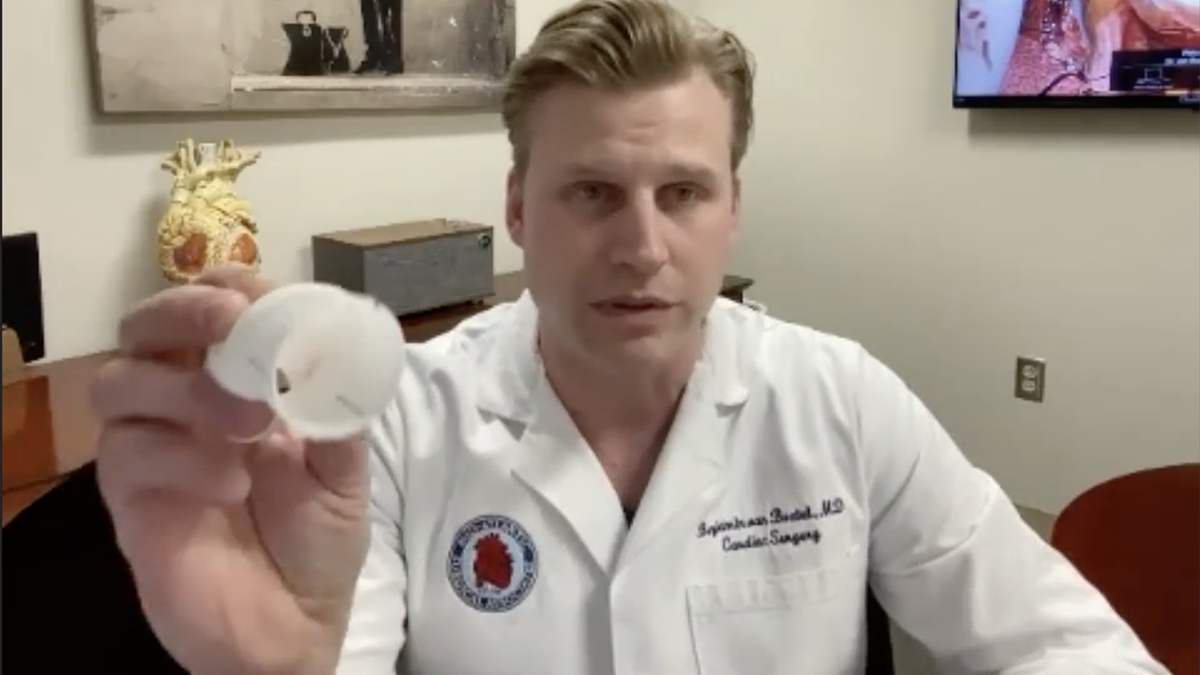
Van Boxtel holds up a “tube-shaped graft” model used during a valve sparing root operation, in which the surgeon “replaces the aortic root and then hand-sews leaflet by leaflet inside that graft.” (Angelica Stabile/Fox News Digital)
“Or it can cause something called an aortic dissection, which is also potentially very fatal, and becomes a surgical emergency,” he said. “That’s unfortunately how a lot of people who have Marfan syndrome pass away.”
Many of those people don’t even know they have the syndrome, Van Boxtel noted.
A valve-sparing root procedure performed before a dilated aorta dissects can be a life-saving operation.
TWO WOMEN WITH HEART DISEASE HAD TO FIGHT FOR A DIAGNOSIS. HERE’S HOW THEY ADVOCATED FOR THEIR HEALTH
Marfan syndrome can be difficult to spot, according to Van Boxtel, as it’s often marked by common symptoms such as chest pain, poor vision — or being tall and having long limbs.
“When you have an aneurysm [from a] dilated aorta, it’s generally asymptomatic, meaning you feel absolutely nothing,” he said. “You feel completely fine … Aneurysm disease is silent, it’s asymptomatic — which can be really dangerous.”
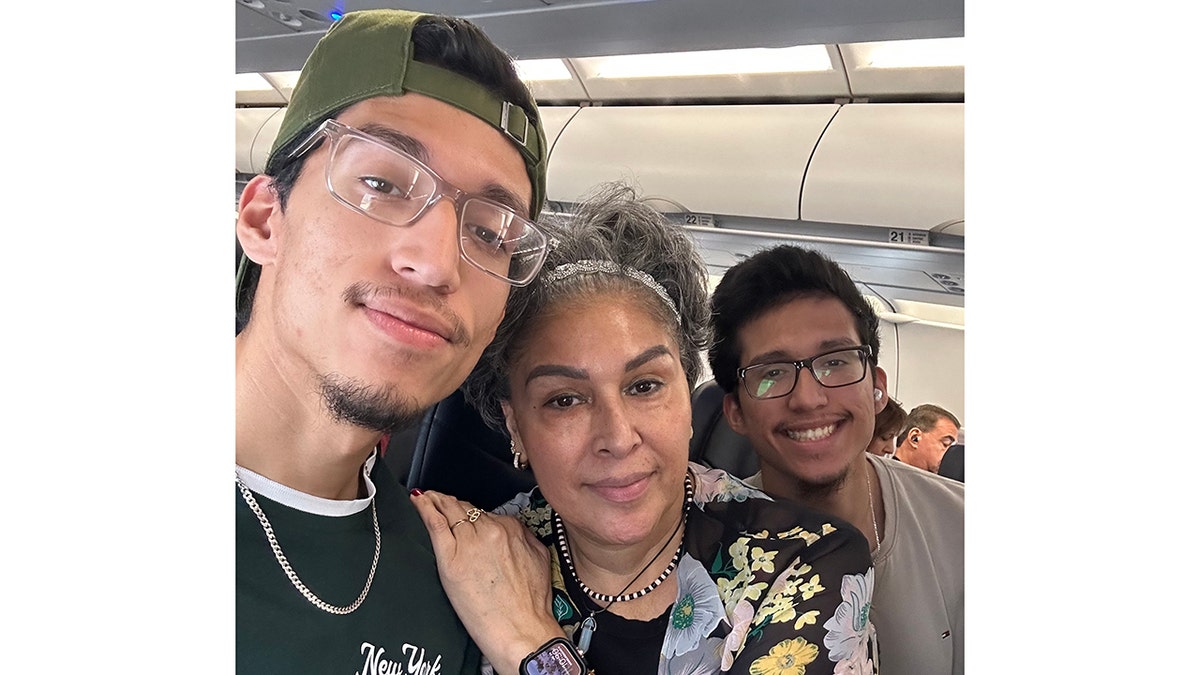
Left to right, Julio Delcid, the twins’ mother, Betulia Miranda, and Pablo Delcid snap a selfie. (Pablo and Julio Delcid)
Pablo Delcid, for his part, said there’s “not much you can feel when you’re growing into the condition.”
He added, “What we didn’t know was that our bodies were changing … obviously with height, vision, the length of our arms, feet, legs, even with our chest.”
Surgery on the same day
The twins’ mother, Betulia Miranda, had an emergency procedure on Oct. 8, 2023, after experiencing an aortic dissection, which the boys described as “excruciating” for her.
After their mother’s surgery was a success, the twins decided to seek preventative surgery performed by Dr. Van Boxtel – but their one request was that they do it together.
“Of course they’re like, ‘Can we go at the same time?’” the doctor said with a laugh.
FLORIDA BRAIN TUMOR PATIENT PLAYS GUITAR DURING HIS SURGERY: ‘THIS IS WILD’
Van Boxtel, a father of twins himself, said the double surgery was like “nothing I’ve ever done before.”
He said, “I’ve done this procedure hundreds of times. But to do it back-to-back on twin brothers — it was an experience, that’s for sure.”
It was decided that Pablo Delcid would go first, since he was born five minutes before his brother, followed by Julio Delcid several hours later.
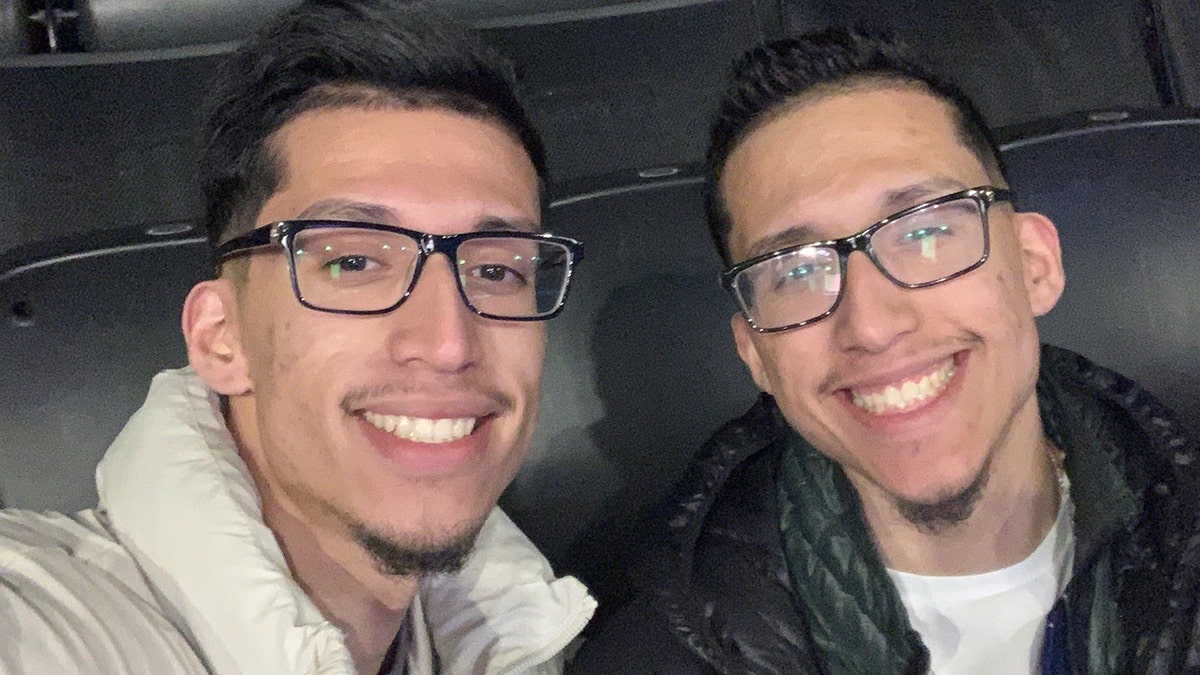
Julio Delcid, left, and Pablo Delcid underwent heart surgery on Jan. 5, 2024. (Pablo and Julio Delcid)
“We always do everything together,” Pablo Delcid said. “We live together, go through everything together … We didn’t think we could get the operation done together, but everything [was] successful.”
The twins agreed that they felt “safer” knowing they were going through the procedure together.
“You kind of feel like you’re not going to lose that person,” Julio Delcid said. “They’re sticking with you, side by side.”
“Aneurysm disease is silent, it’s asymptomatic — which can be really dangerous.”
Pablo Delcid added, “It’s like your gut’s telling you, ‘All right, if I make it, he’s going to make it.’”
On surgery day, Jan. 5, 2024, Van Boxtel and his team distinguished the twins from one another using color-coded ankle bracelets.
The surgeon emphasized the rarity of double heart surgery on twins, especially at such a young age of 21. “This is like the ultimate twin study,” he said.
Van Boxtel said it was “freaky” when he realized that the brothers’ hearts were also identical.
“I knew they could be different on the inside, but it ended up that they were the exact same,” he said.
Julio Delcid said he was “shocked” that a surgeon like Van Boxtel could take on both surgeries back to back.
“He did the best he could,” he said. “He successfully saved our aortic valves, replacing the aneurysm … We were very appreciative.”
More about Marfan
Marfan syndrome affects about one in 5,000 people, according to Van Boxtel, and impacts men and women equally.
“About 75% of those cases are genetic,” he said. “But about 25% of Marfan cases are actually not inherited. They’re not from a parent. They’re a spontaneous mutation.”
ONE FAMILY DONATES FOUR KIDNEYS TO SAVE A NEW YORK MAN’S LIFE: ‘DEFIED ALL ODDS’
Along with a dilated aortic root (enlarged aorta) or narrow dissection (tear in an artery), patients also run the risk of having a leaky valve, which can lead to heart failure symptoms like shortness of breath, chest pain, dizziness and inability to perform normal exertional activity, Van Boxtel said.
Since Marfan syndrome is often hard to spot on the surface, the Delcid twins emphasized the importance of getting tested, especially for those within the Latin and Hispanic communities.
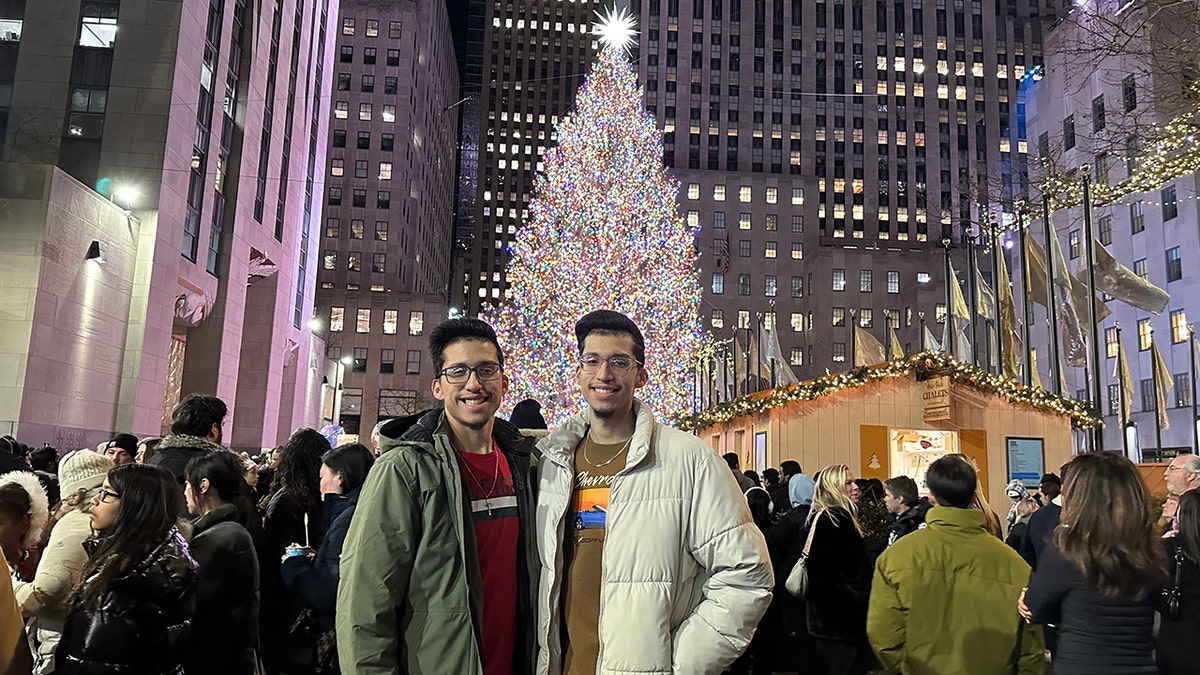
Julio Delcid said that those at risk of Marfan syndrome should “take the time to get yourself checked out.” (Pablo and Julio Delcid)
“It’s pretty lethal,” Pablo Delcid said. “We almost lost our mother, and that was a traumatic experience.”
People with symptoms or with a family history of Marfan syndrome should educate themselves on how best to prevent an aneurysm and connect with a cardiology team, Julio Delcid reiterated.
ARIZONA STUDENTS RAISE NEARLY $10K FOR HEART SURGERY FOR TEACHER’S WIFE: ‘MADE ME CRY’
“It’s just very important to take the time and the opportunity to get the best treatment that they could possibly get, because if they wait, consequences will happen later,” he said.
“Don’t fear anything. Just take the time to get yourself checked out and get the help that you need to live a better life.”
Looking ahead with new hope
With the stresses of heart surgery behind them, the twins said they’re looking forward to getting outside, playing sports and exercising more than they could before.
“Both their valves were saved,” Van Boxtel said. “They weren’t leaking at the end. All the things that we look for in a very successful repair they had, and they’re going to go on and live normal, healthy lives.”
“It’s a very serious problem … but there’s prevention available, and if you get it at the right time, it can be very successful.”
He said he hoped that “these valves last a really, really long time, if not the rest of their lives. They’re much better off now than they were walking around with aneurysms.”
CLICK HERE TO SIGN UP FOR OUR HEALTH NEWSLETTER
Van Boxtel thanked his team for handling the complex, same-day operations on young men with their “whole lives ahead of them.”

Dr. Benjamin Van Boxtel is a cardiovascular surgeon and the surgical director of the Atlantic Aortic Center at Morristown Medical Center. (Atlantic Health System)
The Marfan Foundation has various resources for patients at all stages of the condition, the doctor noted.
“I can’t underscore how important it is for patients with aneurysms to be seen by a surgeon or a team who is comfortable performing that,” he said.
“It’s a very, very serious problem … but there’s prevention available, and if you get it at the right time, it can be very successful.”
For more Health articles, visit www.foxnews.com/health.

Health
The Oatzempic Diet Is Going Viral, but Does It Work? Here’s How To Tap Real Weight Loss Benefits

Sign Up
Create a free account to access exclusive content, play games, solve puzzles, test your pop-culture knowledge and receive special offers.
Already have an account? Login
Forgot your password?
Get back to the Sign In
Use left and right arrow keys to navigate between menu items.
Use escape to exit the menu.
Health
Grieving during Mother’s Day: 5 tips for navigating the first holiday after losing a mom
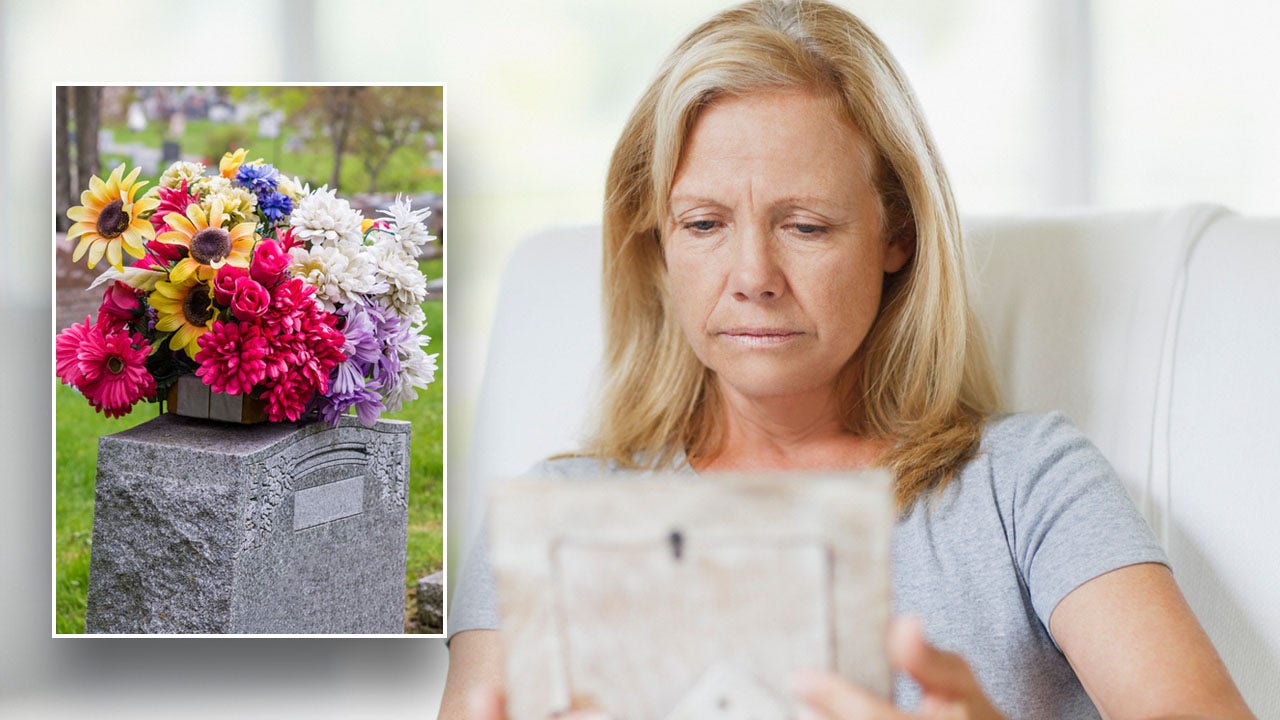
Mother’s Day is a celebration for most. Yet for those who have lost their moms, it can be a difficult day marked by grief and isolation.
“The first year after any loss can be awful, but the holidays stand out in particular,” noted Rebecca Feinglos, a certified grief support specialist in North Carolina and founder of Grieve Leave, an online community to support grievers.
“Your first Mother’s Day after the death of your mom can make her absence feel even more real. It’s a stark reminder of the permanence of the loss.”
3 SURPRISING LESSONS AFTER LOSING A SPOUSE AND TRYING TO MOVE FORWARD IN LIFE: ‘STILL EVOLVING’
For those who had a close bond with their mother, Feinglos said the absence can feel like a “gaping hole” in their everyday lives.
“And for those whose relationships with their mothers were less than ideal, Mother’s Day can bring up a whole different set of emotions,” she said.
For those who have lost their mothers, Mother’s Day can be a difficult day to manage. A certified grief support specialist (not pictured) shares insights and help for coping. (iStock)
“There may be a mix of grief for the relationship they never had, along with anger or resentment over past hurts.”
“The key is to be intentional about how you want to spend the day.”
It doesn’t help that Mother’s Day is a highly publicized holiday with such an emphasis on the mother-child relationship, Feinglos said.
“Everywhere you turn, there are advertisements, social media posts and conversations centered around celebrating mothers,” she said.
MOTHERS SHARE STORIES OF THEIR LIVES, PLUS TIPS AND INSPIRATION, IN ‘LOVE, MOM’ BY DR. NICOLE SAPHIER
“For those who have recently lost their mom, this constant barrage of Mother’s Day messaging can feel like salt in the wound, regardless of the circumstances of their relationship.”
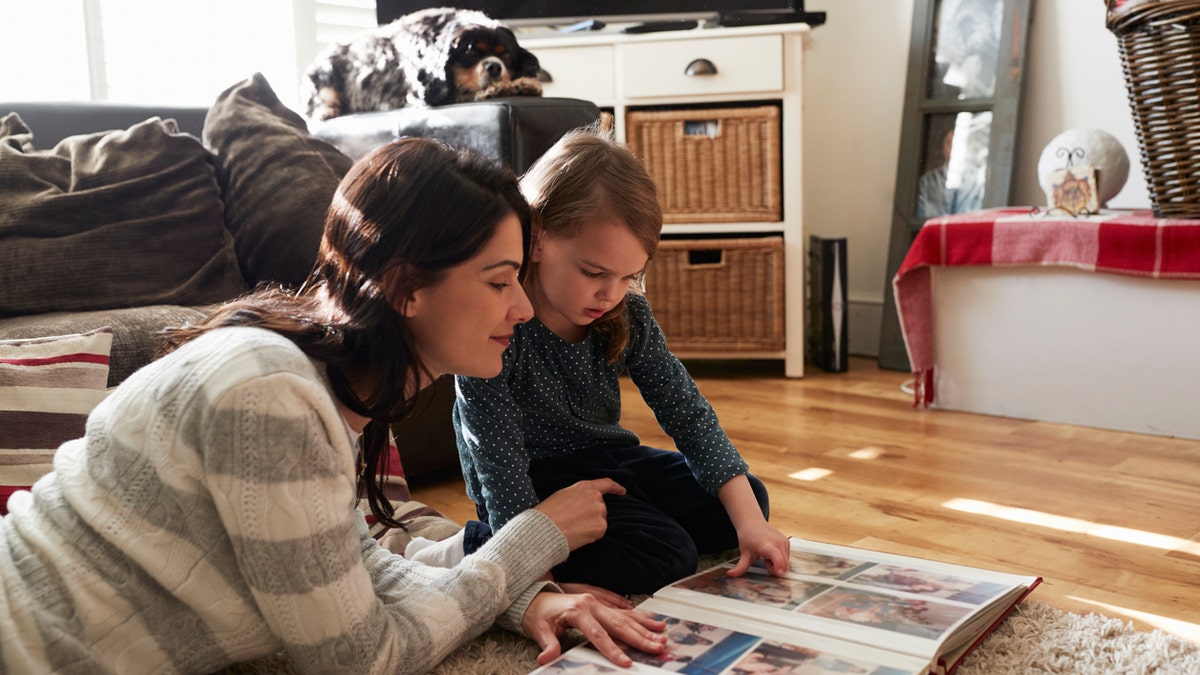
“For those who have recently lost their mom, [the] constant barrage of Mother’s Day messaging can feel like salt in the wound, regardless of the circumstances of their relationship,” an expert said. (iStock)
For those who are approaching their first Mother’s Day after losing a mom, Feinglos offered five tips for navigating the difficult emotions.
1. Make a plan
“Trust me, you don’t want to wake up on your first motherless Mother’s Day with no idea of how to spend the day,” Feinglos said.
“That’s a recipe for a major grief spiral and for potentially doom-scrolling other people’s ‘Happy Mother’s Day’ posts.”
The expert recommends thinking in advance about what you might want your day to look like — and then planning for it.
HOLIDAY GRIEF CAN BE HANDLED IN THESE 9 WAYS, ACCORDING TO MENTAL HEALTH EXPERTS
“It doesn’t have to be anything fancy. Maybe it’s watching your mom’s favorite movies on Netflix, ordering her favorite takeout, or going for a hike on a trail you used to walk together,” she said.
“The key is to be intentional about how you want to spend the day.”
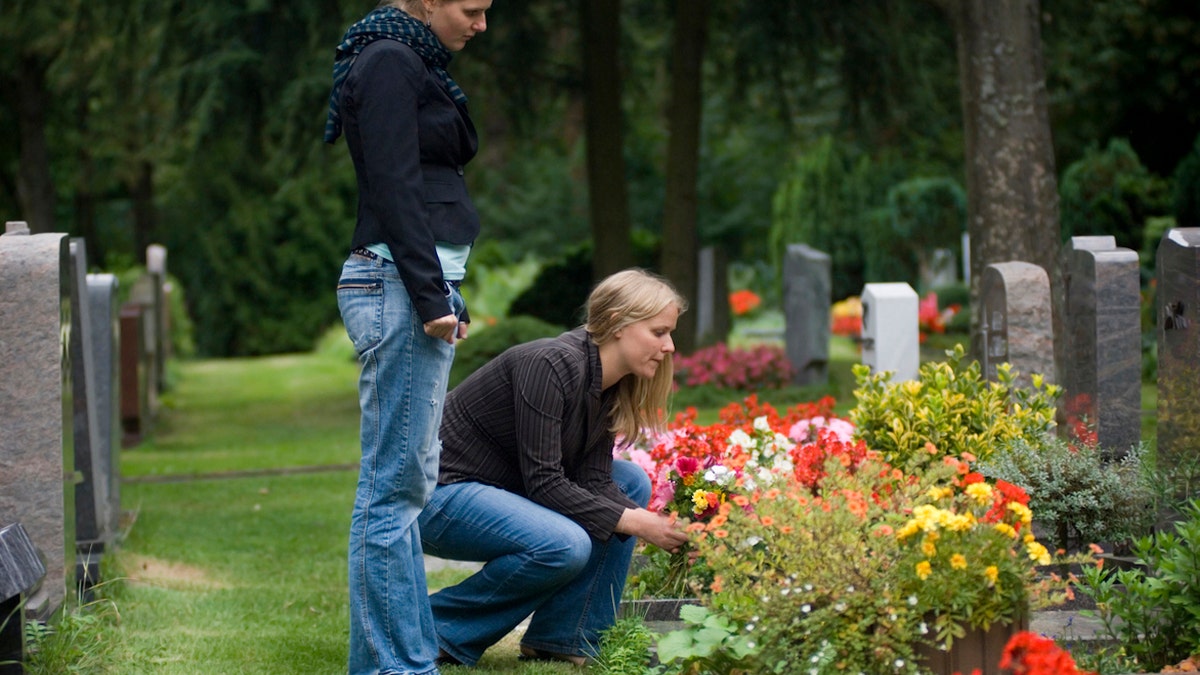
“The first year after any loss can be awful, but the holidays stand out in particular,” a grief expert noted. (iStock)
If you do decide to venture out, Feinglos said, it’s important to be prepared for Mother’s Day-focused events, including restaurant menu specials.
“If that feels like too much to handle, consider having an at-home dinner plan instead,” she suggested.
2. Reach out to others
Grief can be isolating, Feinglos said, and it’s easy to feel like you’re the only one in the world who has ever felt this way.
“But when you’re open and willing to ask for help, you might be surprised by how much better you’ll feel just saying that you’re having a tough time,” she said.
“Your first Mother’s Day after the death of your mom can make her absence feel even more real.”
If you’re feeling overwhelmed or just need someone to talk to, Feinglos said to take the initiative in reaching out, rather than waiting for someone to contact you.
“Pick up the phone, send a text or even just post on social media about how you’re feeling,” she suggested.

Those who are grieving should reach out to family and friends for support, an expert advised. (iStock)
“I have a feeling that your community will be ready and willing to offer their support.”
3. Let people support you
Those who are grieving may be afraid that they’re a burden on friends and loved ones, Feinglos noted.
“But here’s the thing: The people who care about you want to be there for you,” she said.
MOTHER’S DAY: THE BEST ONE-LINERS AND LIFE ADVICE I’VE EVER GOTTEN FROM MOM
“So, when your best friend offers to come over on Mother’s Day and hang out, or your sibling suggests a family Zoom call, say yes. Letting others show up for you can make the day feel a little less overwhelming.”
4. Create a ritual to make space for your grief
One of the most meaningful things you can do on Mother’s Day, according to Feinglos, is to “intentionally create a ritual that makes space for your grief.”

Journaling or writing a letter to your late mother is one way to process your feelings on Mother’s Day. (iStock)
“That could mean writing your late mother a letter and burning it or casting it into a body of water, visiting a place that was special to both of you, listening to her favorite music — or doing something that reflects her values and passions,” she said.
The idea is to do something intentional that helps you feel connected to your mom, even though she’s not physically there, the expert said.
“By creating space for your grief, you’re giving yourself permission to feel all the complicated emotions that come with loss.”
“Your relationship with your person can continue even when they’ve died,” Feinglos said.
GRATITUDE OVERSHADOWS GREAT LOSS, SAYS AUTHOR OF BOOK ABOUT LOSING WIFE TO CANCER
“By creating space for your grief, you’re giving yourself permission to feel all the complicated emotions that come with loss.”
5. Know that there are different shades of grief
Grief doesn’t follow any rules or timelines, Feinglos said — and it can look completely different from one person to the next, especially because every bond is unique.
“There’s no one ‘normal’ way grief plays out,” she said.
“For some, it might hit like a tsunami of tears, especially on gut-punch days like Mother’s Day.”
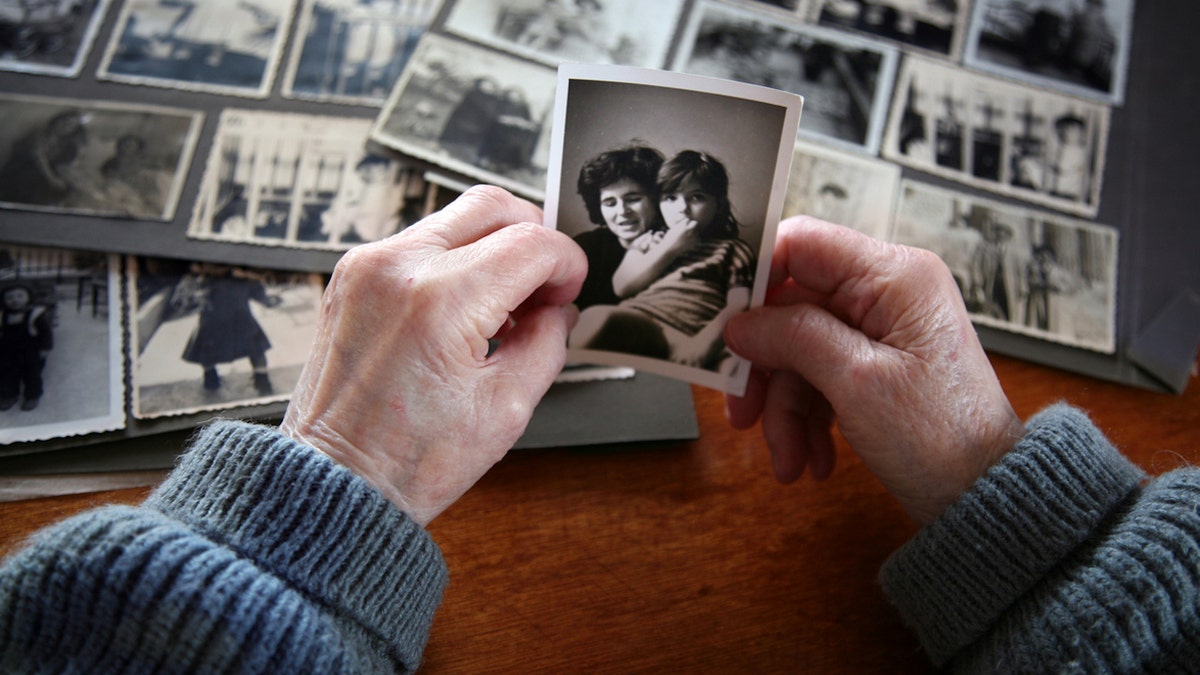
It’s important not to suppress or ignore feelings of grief on Mother’s Day, a mental health expert said. (iStock)
“Maybe you vacillate between being present one moment and feeling utterly numb the next, laughing through tears one day and feeling bitter anger the next.”
On a day like Mother’s Day, Feinglos said, you might find that your thoughts loop back to your loved one regularly, or you could tend to avoid anything that could stir up memories.
CLICK HERE TO SIGN UP FOR OUR HEALTH NEWSLETTER
Whatever way your grief manifests, Feinglos emphasized the importance of not trying to suppress or ignore it.

“At its core, grief underscores one truth: You’re alive, you’re human, and you’re going through a loss,” an expert said. (iStock)
“When we disregard our grief, it can pop back up in ways that are really inconvenient, or even scary — like lashing out at loved ones, feeling hopeless or [engaging in] risky behaviors,” she told Fox News Digital.
“Give yourself the space and time to relearn what your life is like now with this loss in mind,” she continued.
“At its core, grief underscores one truth: You’re alive, you’re human, and you’re going through a loss.”
For more Health articles, visit www.foxnews.com/health.
Health
Struggling to fall asleep? Try this simple trick to drift off quickly

For those who are struggling to get enough sleep, the ABCs may be the key to getting more Zzzs.
A sleep shortcut that’s making the rounds on TikTok uses the alphabet to help people drift off.
Sleep experts shared their input on the unconventional route to restful nights.
HAVING TROUBLE SLEEPING? IT COULD BE FOR THIS SURPRISING REASON, EXPERTS SAY
The technique isn’t new, but it’s been circulating on social media in recent weeks.
Here’s how it works: The wanna-be sleeper chooses a category — whether it’s song titles, vacation destinations or anything that strikes their fancy — and then thinks of something for every letter of the alphabet.
A sleep shortcut that’s making the rounds on TikTok uses the alphabet to help people drift off. (iStock)
For instance, if the category is colors, A might be Aqua, B could be Blue, C could be Chartreuse, and so on.
The idea is that, over time, the exercise will lull the person to sleep.
There are other variations of the alphabet hack, such as picturing each letter being written and erased to help induce sleep.
AMERICANS NEED MORE SLEEP, LESS STRESS, EXPERTS SAY, AS GALLUP POLL REVEALS TROUBLING FINDINGS
Sleep expert Jeff Kahn, the Chicago-based CEO and co-founder of Rise Science, maker of the sleep and energy tracker app RISE, pointed out that the alphabet method hasn’t been studied, but that it likely works by distracting the person from focusing on the inability to sleep.
“This is how the larger category of distraction techniques can help with sleep, anxiety and managing pain, among other challenges,” he told Fox News Digital.
“You can’t force sleep — and thinking about falling asleep or about how you can’t fall asleep is a surefire way to delay it.”

If lack of sleep is interfering with your quality of life, experts recommend speaking with a doctor about getting assessed for a sleep disorder or other underlying medical conditions. (iStock)
Dr. Chelsie Rohrscheib, a neuroscientist and sleep specialist at Wesper in New York, noted that many people experience an overactive mind when they’re trying to sleep, which makes it difficult for the brain and body to relax — leading to insomnia and poor sleep quality.
“The alphabet hack forces you to stop focusing on stimulating or stressful thoughts, which calms your brain activity and helps the brain enter the first sleep stage,” she told Fox News Digital.
Alternative sleep hacks
If the alphabet method doesn’t work, there are other creative techniques that could help you fall asleep.
“Alternatives include meditation and deep breathing exercises, which focus on not only quieting the mind, but also slowing your heart rate and breathing, which make it easier to enter sleep,” Rohr said.
“You can’t force sleep — and thinking about falling asleep is a surefire way to delay it.”
If none of these techniques are effective, he recommends getting out of bed and going to another quiet, dim area to do a relaxing activity, like reading or listening to music, until you feel sleepy.
Kahn agreed with that advice.

“You can’t force sleep — and thinking about falling asleep or about how you can’t fall asleep is a surefire way to delay it,” an expert said. (iStock)
“A good rule of thumb is, if you can’t fall asleep within 20 to 30 minutes, abandon the pursuit, leave your bed, and do things that are relaxing and distracting, in low or as little light as possible,” he advised.
“Let sleepiness wash over you, which it will, and then head back to bed. Sleep doctors call this a ‘sleep reset.’”
Another technique that works for a lot of people is progressive muscle tension and relaxation, both experts said.
CLICK HERE TO SIGN UP FOR OUR HEALTH NEWSLETTER
“A warm shower immediately before bed also helps to drop your core body temperature quickly once you get out, which stimulates the brain to feel sleepy,” Rohr added.
Optimizing sleep hygiene
“Decades of sleep science research shows that having excellent sleep hygiene is your best bet to regularly fall sleep, stay asleep, and to feel and function your best while awake,” Kahn told Fox News Digital.

Optimizing your sleep hygiene is the best way to “regularly fall sleep, stay asleep, and to feel and function your best while awake,” a sleep doctor warned. (iStock)
Common best practices include keeping a very regular sleep schedule, cutting off caffeine 12 hours before bedtime, avoiding late meals and alcohol, getting sunlight every morning — and keeping your bedroom as cool, dark and quiet as possible.
When to seek help
If you’ve tried everything — including optimizing your sleep environment and routine — and lack of sleep is still interfering with your quality of life, experts recommend speaking with a doctor about getting assessed for a sleep disorder or other underlying medical conditions.
“Because anxiety about sleep can precipitate more sleeplessness and sleeplessness feeds anxiety, I recommend seeking help sooner rather than later,” Kahn said.
For more Health articles, visit www.foxnews.com/health.
-

 Politics1 week ago
Politics1 week agoHouse Republicans brace for spring legislative sprint with one less GOP vote
-

 World1 week ago
World1 week agoAt least four dead in US after dozens of tornadoes rip through Oklahoma
-

 Politics1 week ago
Politics1 week agoStefanik hits special counsel Jack Smith with ethics complaint, accuses him of election meddling
-

 Politics1 week ago
Politics1 week agoAnti-Trump DA's no-show at debate leaves challenger facing off against empty podium
-

 Politics7 days ago
Politics7 days agoThe White House has a new curator. Donna Hayashi Smith is the first Asian American to hold the post
-

 News1 week ago
News1 week agoAs student protesters get arrested, they risk being banned from campus too
-

 News1 week ago
News1 week agoVideo: Police Arrest Columbia Protesters Occupying Hamilton Hall
-

 World1 week ago
World1 week agoNine on trial in Germany over alleged far-right coup plot
